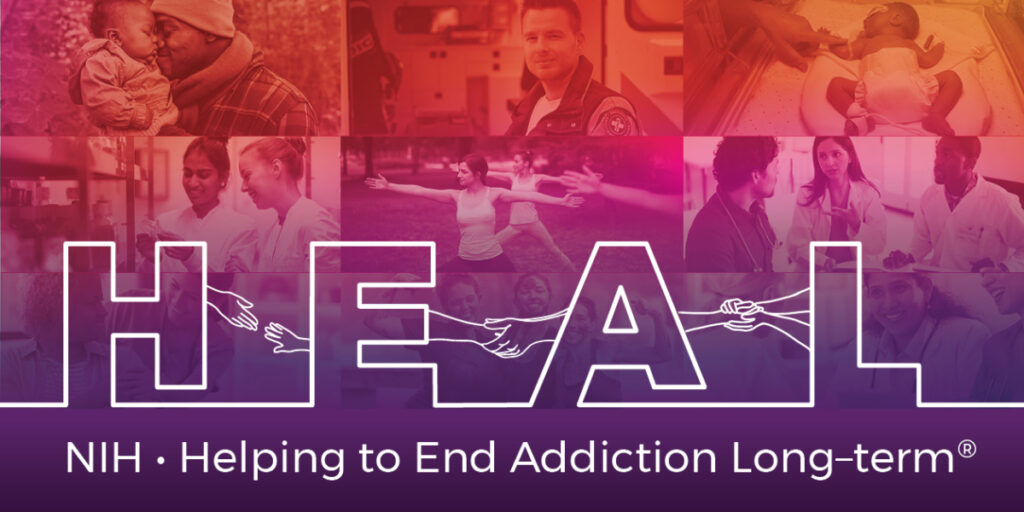Developing a New HEAL Pain Strategic Plan
The National Institutes of Health (NIH) is currently establishing research priorities for the next phase of pain research supported by the NIH HEAL Initiative®. These efforts will contribute to the development of a HEAL strategic plan that builds upon that progress and ensures that the NIH HEAL Initiative continues to evolve along with drivers of the overdose epidemic to provide the greatest benefit to individuals affected by substance use and those living with pain. Learn More About the HEAL Strategic Plan
Public Input on Pain Research Priority Areas
NIH invites the research community and people with lived experience with pain to provide input on the research priorities in a series of public workshops. Please join and make your voice heard!
This workshop series will focus on the following pain research areas:
- Non-addictive pain therapeutics development
- Pain biomarkers and predictors
- Optimization of existing and novel interventions for pain
- Implementation and health services for pain
- Health equity and pain across the life course
- The intersection of pain and substance use disorder
- Pain research workforce and training
Upcoming Workshops
November 6
1:00 – 4:00 PM ET
Co-led by Vivianne Tawfik and Yenisel Cruz-Almeida, presentations and discussion will center around: the lived experience of patients with chronic pain and ways in which their often invisible struggle can be objectively evaluated, predicted and treated; perspectives from both pain and non-pain biomarkers researchers; ideas from other fields that have used biomarkers effectively to develop precision medicine; and industry input regarding the development of biomarkers and predictors.
Register now!
November 15
Non-Addictive Pain Therapeutics Development
10:00 AM – 2:00 PM ET
Co-led by John Markman and Ted Price, presentations and discussion will center around the importance of understanding basic mechanisms of nociception and pain; pre-clinical and clinical translational challenges; target identification and small molecule and biologic development; device development and mechanisms; access to therapeutics, quality of life, and medication side effects; and trial study design and population stratification.
Register now!
November 18
Research Workforce and Training
1:00 PM – 5:00 PM ET
Co-led by Cheryl Stucky and Jennifer Haythornthwaite, presentations and discussion will center around: building and bringing in new individuals to pain research; supporting and retaining existing trainees and early career investigators; supporting mid-career pain scientists who prioritize and have a track record in training and mentoring; and training for researchers to effectively engage with individuals who have lived experience in a respectful and efficient manner.
Register now!
November 19
Implementation and Health Services
12:00 – 4:00 PM ET
Co-led by Lynn DeBar and Steve George, topics will focus on: review of barriers to implementing guideline recommended pain care, trial designs best suited for enhancing implementation and sustainability, leveraging EHR & other technology to support provision of evidence-based pain care, aligning research with clinical care metrics while considering perspectives of multiple stakeholders, & overall pathways of care within healthcare systems (including replacement of low-value treatments for pain).
Register now!
November 25 (Tentative Date)
Optimizing Interventions to Improve Pain Management
11:00 AM – 3:00 PM ET
Co-led by John T. Farrar and Claudia Campbell, presentations and discussion will center around optimizing existing or novel interventions to better suit patient populations; understanding who responds to which treatments; and incorporating the views of individuals with lived experience in development and optimization of interventions.
Register now!
December 2
The Intersection of Pain and Substance Use
11:00 AM – 3:00 PM ET
Co-led by Jessica Merlin and Joanna Starrels, presentations and discussion will center around the reciprocal model of pain and substance use, in which pain leads to substance use, and in turn, substance use exacerbates pain. Topics of interest at the workshop include: buprenorphine, personalized medicine approaches, polysubstance use, use of cannabis and psychedelics, and populations that are disproportionately affected by both pain and SUD.
Register now!
December 6
Health Equity and Pain Across the Life Course
1:30 PM – 4:00 PM ET
Co-led by Susmita Kashikar-Zuck and Tamara Baker, the workshop will focus on understanding how health equity in pain can be achieved through research, including: exploring the impact of many types of diversity of pain experience across the lifespan, intersectionality & social determinants of health, & barriers to research and care for certain groups. Persons with lived experience of pain will share their expertise to ensure that research programs best meet the needs of people living with pain.
Register now!
Next Steps
The recommended priorities for HEAL pain research will be refined and presented at the February National Institute of Neurological Disorders and Stroke Advisory Council meeting. This will contribute to an overall NIH HEAL Initiative Strategic Plan in summer 2025 that will guide the research investment for the next 5 years. To stay apprised of strategic planning efforts and opportunities to provide input, make sure you are subscribed to the HEAL Digest.
Connect With Us
Join the HEAL conversation by using #nihHEALinitiative or searching for the hashtag on X to see other HEAL posts. For information related to opioid use disorder and overdose, follow NIDA on X at @NIDANews. For information related to HEAL pain research, follow NINDS on X at @NIH_NINDS.
Subscribe to the NIH HEAL Initiative email list and get the NIH HEAL Initiative Digest and other HEAL news sent directly to your inbox.
If you have questions or thoughts about pain research priorities, get in touch: HEALquestion@od.nih.gov and include “HEAL Pain Strategic Planning” in your subject line.
The 2025 USASP Annual Scientific Meeting will be held April 29- May 2, 2025, in Chicago, Illinois. Click here to learn more.
USASP is registered as a 501(c)(3) non-profit organization, tax ID 84-4008678. All donations are tax-deductible to the fullest extent of the law.


